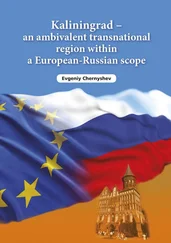(d) Terms designed to disrupt the iron curtain and to assure a liberal flow of outside ideas and a considerable establishment of personal contact between persons within the zone of Soviet power and persons outside it.
So much for our aims with respect to any residual Soviet authority. There remains the question of what our aims would be with respect to any non-communist authority which might be set up on a portion or all of Russian territory as a consequence of the events of war.
First of all, it should be said that regardless of the ideological basis of any such non-communist authority and regardless of the extent to which it might be prepared to do lip service to the ideals of democracy and liberalism, we would do well to see that in one way or another the basic purposes were assured which flow from the demands listed above. In other words, we should set up automatic safeguards to assure that even a regime which is non-communist and nominally friendly to us:
(a) Does not have strong military power;
(b) Is economically dependent to a considerable extent on the outside world;
(c) Does not exercise too much authority over the major national minorities; and
(d) Imposes nothing resembling the iron curtain over contacts with the outside world.
In the case of such a regime, professing hostility to the communists and friendship toward us, we should doubtless wish to take care i.o impose these conditions in a manner which would not be offensive or humiiiating. But we would have to see to it that in one way or another they were imposed, if our interests and the interests of world peace were to be protected.
We are therefore safe in saying that it should be our aim in the event of war with the Soviet Union, to see to it that when the war was over no regime on Russian territory is permitted:
(a) To retain military force on a scale which could be threatening to any neighboring stale;
(b) To enjoy a measure of economic autarchy which would permit the erection of the economic basis of such armed power without the assistance of the western world;
(c) To deny autonomy and self-government to the main national minorities; or
(d) To retain anything resembling the present iron curtain. If these conditions are assured, we can adjust ourselves to any political situation which may ensue from the war. We will then be safe, whether a Soviet government retains the bulk of Russian territory or whether it retains only a small part of such territory or whether it disappears altogether. And we will be safe even though the original democratic enthusiasm of a new regime is short-lived and tends to be replaced gradually by the a-social concepts of international affairs to which the present Soviet generation has been educated.
The above should be adequate as an expression of our war aims in the event that political processes in Russia take their own course under the stresses of war and that we are not obliged to assume major responsibility for the political future of the country. But there are further questions to be answered for the event that Soviet authority should disintegrate so rapidly and so radically as to leave the country in chaos, making it encumbent upon us as the victors to make political choices and to take decisions which would be apt to shape the political future of the country. For this eventuality there are three main questions which must be faced.
4. PARTITION VS. NATIONAL UNITY
First of all, would it be our desire, in such a case, that the present territories of the Soviet Union remain united under a single regime or that they be partitioned? And if they are to remain united, at least to a large extent, then what degree of federalism should be observed in a future Russian government? What about the major minority groups, in particular the Ukraine?
We have already taken note of the problem of the Baltic states. The Baltic states should not be compelled to remain under any communist authority in the aftermath of another war. Should the territory adjacent To the Baltic slates be controlled by a Russian authority other than a communist authority, we should be guided by the wishes of the Baltic peoples and by the degree of moderation which that Russian authority is inclined to exhibit with respect to them.
In the case of the Ukraine, we have a different problem. The Ukrainians are the most advanced of the peoples who have been under Russian rule in modern times. They have generally resented Russian domination; and their nationalistic organizations have been active and vocal abroad. It would be easy to jump to the conclusion that they should be freed, at last, from Russian rule and permitted to set themselves up as an independent slate.
We would do well to beware of this conclusion. Us very simplicity condemns it in terms of eastern European realities.
It is True that the Ukrainians have been unhappy under Russian rule and that something should be done to protect their position in future. But there are certain basic fads which must not be lost sight of. While the Ukrainians have been an important and specific element in the Russian empire, they have shown no signs of being a '"nation" capable of bearing successfully the responsibilities of independence in the face of great Russian opposition. The Ukraine is not a clearly defined ethnical or geographic concept. In general, the Ukrainian population made up of originally in large measure out of refugees from Russian or Polish despotism shades off imperceptibly into the Russian or Polish nationalities. There is no clear dividing line between Russia and the Ukraine, and it would be impossible to establish one. The cities in Ukrainian territory have been predominantly Russian and Jewish. The real basis of "Ukrainianism" is the feeling of "difference" produced by a specific peasant dialect and by minor differences of custom and folklore throughout the country districts. The political agitation on the surface is largely the work of a few romantic intellectuals, who have little concept of the responsibilities of government.
The economy of the Ukraine is inextricably intertwined with that of Russia as a whole. There has never been any economic separation since the territory was conquered from the nomadic Tatars and developed for purposes of a sedentary population. To attempt to carve it out of the Russian economy and to set it up as something separate would be as artificial and as destructive as an attempt to separate the Corn Belt, including the Great Lakes industrial area, from the economy of the United States.
Furthermore, the people who speak the Ukrainian dialect have been split, like those who speak the White Russian dialect, by a division which in eastern Europe has always been the real mark of nationality: namely, religion- If any real border can be drawn in the Ulcraine, it should logically be the border between the areas which traditionally give religious allegiance to the Eastern Church and those which give it to the Church of Rome.
Finally, we cannot he indifferent to the feelings of the Great Russians themselves. They were the strongest national element in the Russian Empire, as they now are in the Soviet Union. They will continue to be the strongest national element in that general area, under any status. Any long-term U.S. policy must be based on their acceptance and their cooperation. The Ukrainian territory is as much a part of their national heritage as the Middle West is of ours, and they are conscious of that fact. A solution which attempts to separate the Ukraine entirely from the rest of Russia is bound TO incur their resentment and opposition, and can be maintained, in the last analysis, only by force- There is a reasonable chance that the Great Russians could be induced to tolerate the renewed independence of the Baltic states. They tolerated the freedom of those territories from Russian rule for long periods in the past; and they recognize, subconsciously if not other' wise, that the respective peoples are capable of independence. With respect to the Ukrainians, things arc different. They are loo close to the Russians to be able to set themselves up successfully as something wholly different, For better or for worse, they will have to work out their destiny in some sort of special relationship to the Great Russian people.
Читать дальше










